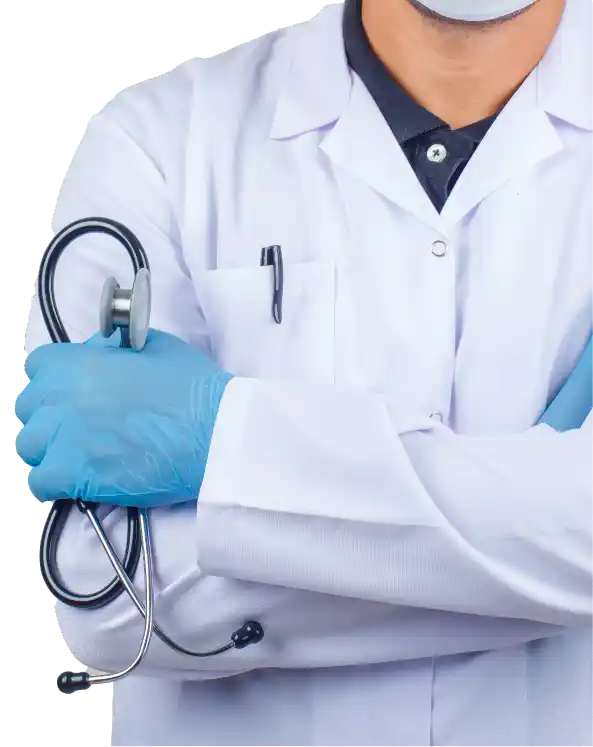Acne - Meaning, Types, Symptoms, Causes & Treatment
Acne refers to pimples, blackheads, whiteheads, and cysts on the face, neck, chest, and back of the skin. Acne mostly affects adolescents, when hormone levels are fluctuating. However, it can also occur in adulthood, while some people may face this problem throughout their lives.
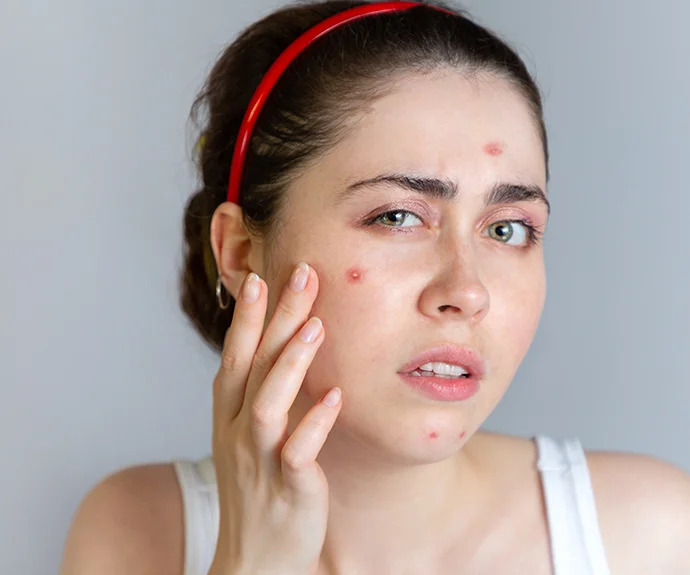
WHAT IS ACNE
Acne is a skin condition in which the skin develops pimples, blackheads, whiteheads, and cysts on the face, neck, chest, and back.
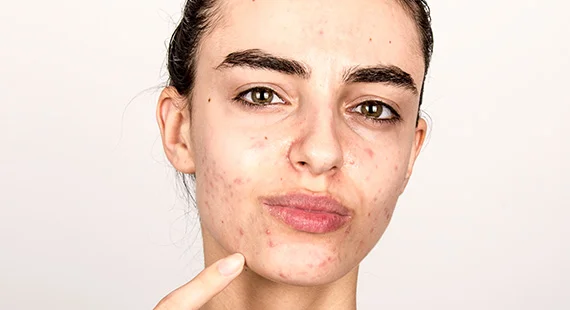
TYPES OF ACNE
Comedonal acne
Blocked pores in skin give rise to blackheads and whiteheads.
1
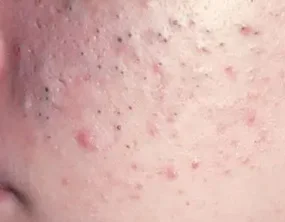
Inflammatory acne
This type of acne is characterized by the presence of red, inflamed pimples, and pustules.
2
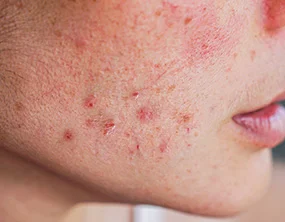
Cystic acne
This type of acne is characterized by the presence of deep, painful cysts that can lead to scarring.
3
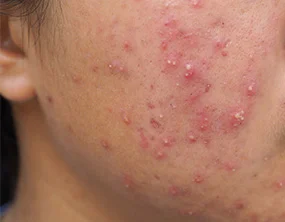
CAUSES
- Excess oil that clog the pores
- Fluctuations in hormone levels
- Genetic makeup
- Certain medications, such as steroids,
SYMPTOMS
- Pimples, blackheads, whiteheads
- Red, inflamed skin
- Painful bumps
- Scarring
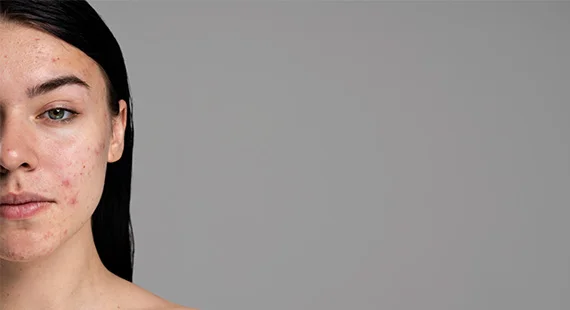
DIAGNOSIS
Physical examination: Acne is diagnosed by a dermatologist, who will examine the skin and ask about the symptoms.
Biopsy - Small skin tissue sample is taken for laboratory testing to know the root cause of acne.
DO's
DONT's
TREATMENTS
Non-surgical treatments
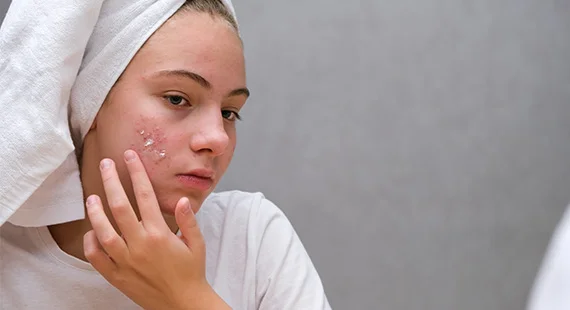
Topical treatments: Dermatologists recommended creams and gels to treat acne.
Oral medications: These include antibiotics, birth control pills, and isotretinoin.
Chemical peels: These use a chemical solution to exfoliate the skin, reducing the appearance of acne.
Light therapy: This uses different wavelengths of light to target the bacteria that causes acne.
Surgical treatments
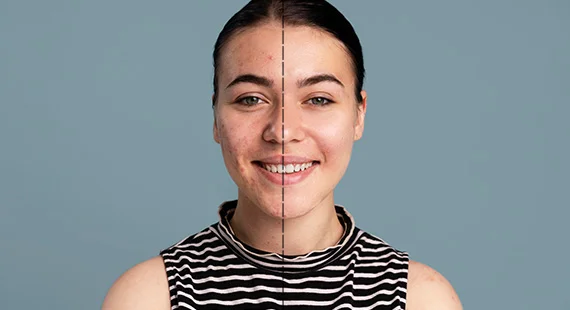
Laser therapy: This uses laser technology to reduce the appearance of acne scars.
Extraction: This involves the removal of blackheads and whiteheads by a healthcare professional.
RISKS AND COMPLICATIONS
- Scarring
- Infection
- Psychological distress
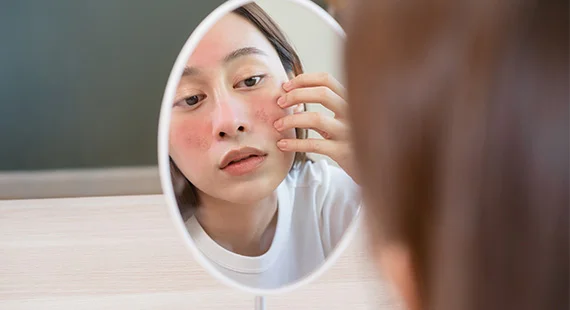
IF LEFT UNTREATED
If left untreated, acne can lead to scarring, which can lead to long term face scars. It can also cause psychological distress and a negative impact on self-esteem.
COST
Treatment costs for acne depend on the type of treatment options your dermatologist recommends. Costs for acne treatment via:
Topical creams and gels: 500 to 1,500 INR per month
Oral medications: 1,000 to 3,000 INR per month
Chemical peels: 2,000 to 6,000 INR per session
Financial Options
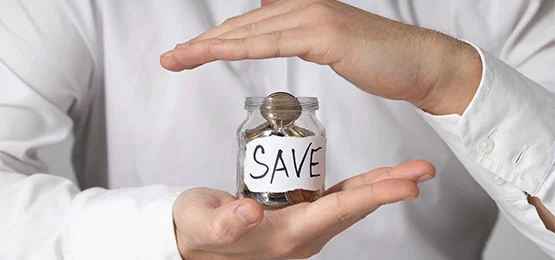
INSURANCE COVERAGE
Treatment costs for acne are usually not covered by health insurance, as it is considered a cosmetic concern rather than a medical necessity. However, in some cases, if the acne is severe and causes scarring, insurance may cover the cost of treatment.

KNOW MORE ABOUT ACNE
Acne can be a frustrating and embarrassing problem for many people, but there are a variety of treatments and techniques available to help you achieve clear, healthy-looking skin. Whether you're dealing with occasional breakouts or more severe acne, there are solutions that can help.
One of the most important steps in preventing and treating acne is maintaining a good skincare routine. This includes washing your face twice a day with a gentle cleanser, using non-comedogenic moisturisers and sunscreen, and avoiding harsh or abrasive products that can irritate your skin. In addition to these basic steps, there are also many products available, such as acne-fighting cleansers, toners, and spot treatments, that can help to control breakouts and reduce the appearance of acne.
For more severe cases of acne, there are also many medical treatments available. These can include prescription medications, such as antibiotics or retinoids, which can help to reduce inflammation and control bacterial growth in the skin. Other treatments, such as chemical peels or light therapy, can help to reduce the appearance of acne scars and improve the overall texture and tone of your skin.
At Glamyo Health, we understand the impact that acne can have on your self-confidence and overall well-being. That's why we offer a range of acne treatments to help you achieve clear, healthy-looking skin. Our experienced team of skincare professionals can help you determine the best treatment plan for your individual needs and goals, and will work with you to create a customised plan that delivers the results you're looking for.
In addition to our acne treatments, we also offer a range of other aesthetic services to help you look and feel your best. From anti-aging treatments and injectables to body contouring and skin tightening, we have everything you need to achieve your aesthetic goals. Our team of knowledgeable professionals will work with you to create a customised treatment plan that is tailored to your unique needs and goals, and we pride ourselves on providing our clients with the highest level of care and service.
So if you're struggling with acne, let Glamyo Health help you achieve clear, healthy-looking skin. Contact us today to schedule a consultation and learn more about our services. We look forward to helping you look and feel your best.
 New Delhi
New Delhi  Bangalore
Bangalore  Mumbai
Mumbai  Hyderabad
Hyderabad  Pune
Pune  Chennai
Chennai 